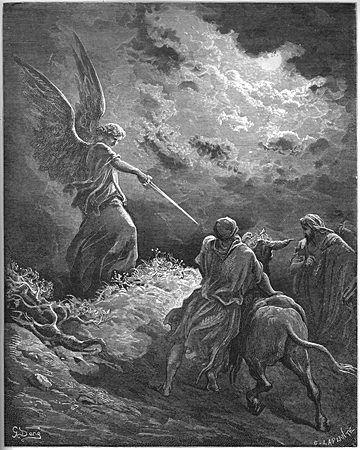2 Peter 2
1 But false prophets also arose among the people, as false teachers will also be among you, who will secretly bring in destructive heresies, denying even the Master who bought them, bringing on themselves swift destruction.
aparaṁ pūrvvakālē yathā lōkānāṁ madhyē mithyābhaviṣyadvādina upātiṣṭhan tathā yuṣmākaṁ madhyē'pi mithyāśikṣakā upasthāsyanti, tē svēṣāṁ krētāraṁ prabhum anaṅgīkr̥tya satvaraṁ vināśaṁ svēṣu varttayanti vināśakavaidharmmyaṁ guptaṁ yuṣmanmadhyam ānēṣyanti|
2 Many will follow their immoral ways, and as a result, the way of the truth will be maligned.
tatō 'nēkēṣu tēṣāṁ vināśakamārgaṁ gatēṣu tēbhyaḥ satyamārgasya nindā sambhaviṣyati|
3 In covetousness they will exploit you with deceptive words: whose sentence now from of old doesn’t linger, and their destruction will not slumber.
aparañca tē lōbhāt kāpaṭyavākyai ryuṣmattō lābhaṁ kariṣyantē kintu tēṣāṁ purātanadaṇḍājñā na vilambatē tēṣāṁ vināśaśca na nidrāti|
4 For if God didn’t spare angels when they sinned, but cast them down to Tartarus, and committed them to pits of darkness to be reserved for judgment; (Tartaroō g5020)
īśvaraḥ kr̥tapāpān dūtān na kṣamitvā timiraśr̥ṅkhalaiḥ pātālē ruddhvā vicārārthaṁ samarpitavān| (Tartaroō g5020)
5 and didn’t spare the ancient world, but preserved Noah with seven others, a preacher of righteousness, when he brought a flood on the world of the ungodly,
purātanaṁ saṁsāramapi na kṣamitvā taṁ duṣṭānāṁ saṁsāraṁ jalāplāvanēna majjayitvā saptajanaiḥ sahitaṁ dharmmapracārakaṁ nōhaṁ rakṣitavān|
6 and turning the cities of Sodom and Gomorrah into ashes, condemned them to destruction, having made them an example to those who would live in an ungodly way,
sidōmam amōrā cētināmakē nagarē bhaviṣyatāṁ duṣṭānāṁ dr̥ṣṭāntaṁ vidhāya bhasmīkr̥tya vināśēna daṇḍitavān;
7 and delivered righteous Lot, who was very distressed by the lustful life of the wicked
kintu taiḥ kutsitavyabhicāribhi rduṣṭātmabhiḥ kliṣṭaṁ dhārmmikaṁ lōṭaṁ rakṣitavān|
8 (for that righteous man dwelling among them was tormented in his righteous soul from day to day with seeing and hearing lawless deeds),
sa dhārmmikō janastēṣāṁ madhyē nivasan svīyadr̥ṣṭiśrōtragōcarēbhyastēṣām adharmmācārēbhyaḥ svakīyadhārmmikamanasi dinē dinē taptavān|
9 then the Lord knows how to deliver the godly out of temptation and to keep the unrighteous under punishment for the day of judgment,
prabhu rbhaktān parīkṣād uddharttuṁ vicāradinañca yāvad daṇḍyāmānān adhārmmikān rōddhuṁ pārayati,
10 but chiefly those who walk after the flesh in the lust of defilement and despise authority. Daring, self-willed, they are not afraid to speak evil of dignitaries,
viśēṣatō yē 'mēdhyābhilāṣāt śārīrikasukham anugacchanti kartr̥tvapadāni cāvajānanti tānēva (rōddhuṁ pārayati|) tē duḥsāhasinaḥ pragalbhāśca|
11 whereas angels, though greater in might and power, don’t bring a slanderous judgment against them before the Lord.
aparaṁ balagauravābhyāṁ śrēṣṭhā divyadūtāḥ prabhōḥ sannidhau yēṣāṁ vaiparītyēna nindāsūcakaṁ vicāraṁ na kurvvanti tēṣām uccapadasthānāṁ nindanād imē na bhītāḥ|
12 But these, as unreasoning creatures, born natural animals to be taken and destroyed, speaking evil in matters about which they are ignorant, will in their destroying surely be destroyed,
kintu yē buddhihīnāḥ prakr̥tā jantavō dharttavyatāyai vināśyatāyai ca jāyantē tatsadr̥śā imē yanna budhyantē tat nindantaḥ svakīyavināśyatayā vinaṁkṣyanti svīyādharmmasya phalaṁ prāpsyanti ca|
13 receiving the wages of unrighteousness; people who count it pleasure to revel in the daytime, spots and defects, reveling in their deceit while they feast with you;
tē divā prakr̥ṣṭabhōjanaṁ sukhaṁ manyantē nijachalaiḥ sukhabhōginaḥ santō yuṣmābhiḥ sārddhaṁ bhōjanaṁ kurvvantaḥ kalaṅkinō dōṣiṇaśca bhavanti|
14 having eyes full of adultery, and who can’t cease from sin, enticing unsettled souls, having a heart trained in greed, accursed children!
tēṣāṁ lōcanāni paradārākāṅkṣīṇi pāpē cāśrāntāni tē cañcalāni manāṁsi mōhayanti lōbhē tatparamanasaḥ santi ca|
15 Forsaking the right way, they went astray, having followed the way of Balaam the son of Beor, who loved the wages of wrongdoing;
tē śāpagrastā vaṁśāḥ saralamārgaṁ vihāya biyōraputrasya biliyamasya vipathēna vrajantō bhrāntā abhavan| sa biliyamō 'pyadharmmāt prāpyē pāritōṣikē'prīyata,
16 but he was rebuked for his own disobedience. A speechless donkey spoke with a man’s voice and stopped the madness of the prophet.
kintu nijāparādhād bhartsanām alabhata yatō vacanaśaktihīnaṁ vāhanaṁ mānuṣikagiram uccāryya bhaviṣyadvādina unmattatām abādhata|
17 These are wells without water, clouds driven by a storm, for whom the blackness of darkness has been reserved forever. (questioned)
imē nirjalāni prasravaṇāni pracaṇḍavāyunā cālitā mēghāśca tēṣāṁ kr̥tē nityasthāyī ghōratarāndhakāraḥ sañcitō 'sti| (questioned)
18 For, uttering great swelling words of emptiness, they entice in the lusts of the flesh, by licentiousness, those who are indeed escaping from those who live in error;
yē ca janā bhrāntyācārigaṇāt kr̥cchrēṇōddhr̥tāstān imē 'parimitadarpakathā bhāṣamāṇāḥ śārīrikasukhābhilāṣaiḥ kāmakrīḍābhiśca mōhayanti|
19 promising them liberty, while they themselves are bondservants of corruption; for a man is brought into bondage by whoever overcomes him.
tēbhyaḥ svādhīnatāṁ pratijñāya svayaṁ vināśyatāyā dāsā bhavanti, yataḥ, yō yēnaiva parājigyē sa jātastasya kiṅkaraḥ|
20 For if, after they have escaped the defilement of the world through the knowledge of the Lord and Savior Jesus Christ, they are again entangled in it and overcome, the last state has become worse for them than the first.
trātuḥ prabhō ryīśukhrīṣṭasya jñānēna saṁsārasya malēbhya uddhr̥tā yē punastēṣu nimajjya parājīyantē tēṣāṁ prathamadaśātaḥ śēṣadaśā kutsitā bhavati|
21 For it would be better for them not to have known the way of righteousness, than after knowing it, to turn back from the holy commandment delivered to them.
tēṣāṁ pakṣē dharmmapathasya jñānāprāpti rvaraṁ na ca nirddiṣṭāt pavitravidhimārgāt jñānaprāptānāṁ parāvarttanaṁ|
22 But it has happened to them according to the true proverb, “The dog turns to his own vomit again,” and “the sow that has washed to wallowing in the mire.”
kintu yēyaṁ satyā dr̥ṣṭāntakathā saiva tēṣu phalitavatī, yathā, kukkuraḥ svīyavāntāya vyāvarttatē punaḥ punaḥ| luṭhituṁ karddamē tadvat kṣālitaścaiva śūkaraḥ||





















